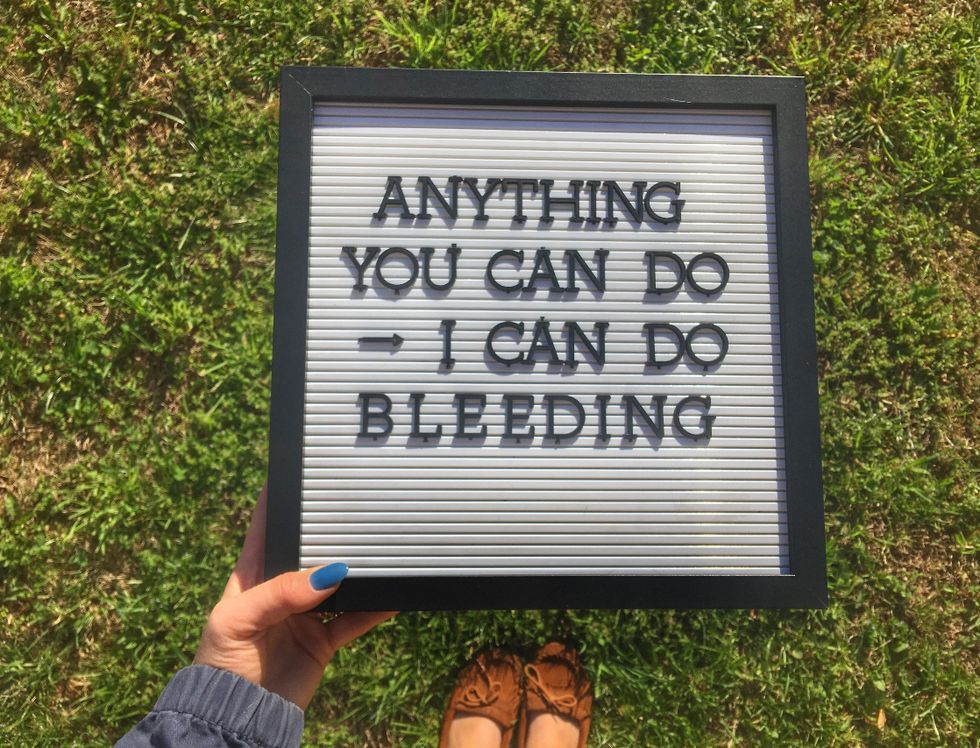Visit from Aunt Flo, On the Rag, Red Badge of Courage, Crimson Tide, Moon Time. Whichever slang you use, we are all referring to the same topic. A topic that in today's society is still considered taboo: menstruation.
According to The Independent, there are at least 5,000 different euphemisms for 'period,' the time of the month when the female body sheds the uterus causing the blood and tissues lining it to release from the body.
The most common symptoms of this process are moodiness, depression, cramping, bloating and food cravings.
Each woman is estimated to have 450 periods during their lifetime. Women make up right at 50 percent of the population, so why can't we talk about our cycle without feeling embarrassed or as if we are alone?
Menstruation has been a part of female life since before the human body had even fully evolved. In history, the bleeding of the female body without direct causation was considered controlled directly by the moon.
Because there weren't scientific advancements describing the way biology worked, periods were almost seen as a paranormal-type experience. Women were shunned, literally kicked out of the house and sent to sleep in separate quarters during that time of the month, labeled as witches, seen as cursed and were not allowed to integrate into society until the bleeding had stopped.
Many societies, such as East Africa, thought that a woman on her period had the ability to dry out crops and make cows infertile. Others thought that they had the power to kill bees and stop hailstorms. The French thought that sex on your period would create "monsters," while medieval Europeans thought that period blood could cure leprosy.
Because most scribes and writers during ancient times were males, there is not a lot of documentation referring to the menstrual cycle or what was to come of females during this time.
There is, however, studies suggesting that women probably had a substantially fewer number of periods than today due to malnourishment and earlier menopause.
Of course, sanitation was nearly impossible during this time. Tampons were made from wood wrapped in thick string and pads were used from cloths and washed and reused each month.
Today, in 2018, although we have had some advancements as far as not throwing women into a different outside building for them to bleed alone, menstruation is still a subject that is thought by many to be better not to have.
The most recent Diagnostic and Statistical Manual of Mental Disorders, Fifth Edition (DSM-5), actually has a disorder named stemming from PMS.
The disorder is titled Premenstrual Dysphoric Disorder and it is defined as "a form of premenstrual syndrome consisting of a cluster of affective, behavioral, and somatic symptoms such as irritability, depressed mood, anxiety, and tension."
In other words, according to this, all females who experience a period and who have side effects from such have a diagnosable mental illness. The DSM is written by EXPERTS in neuroscience, biology, genetics etc. who actually believe that every female has a mental illness...that a natural process is a mental deficiency.
Public school systems lack the needed formal education in regards to periods and period preparation.
There are classes on how to practice safe sex (a choice), but not how to take care of sanitation during four to seven days of every month when the female body is bleeding (inevitable).
We, as women in the 21st century, deserve to get the attention we need when it comes to our health.
We, as women in the 21st century, should no longer feel embarrassed when we on our periods.
We should not have to whisper to ask for a tampon because we don't have one.
We should not have to pay $1 in public restrooms for a necessity.
We should not have to ask our friends to casually walk behind us to check our behinds to make sure we didn't bleed through.
We are women, and we are powerful. We literally have the ability to create and house another human inside of our bodies. We have overcome some of the most challenging obstacles in history... we can overcome the stigma associated with this.
We need to step up and fight for our right as women. We need to no longer feel hushed when it comes to our bleeding bodies.








































